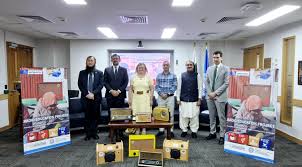UNESCO and Italy to promote learning in isolated areas of Pakistan through interactive radio instruction

Celina Ali
Islamabad: UNESCO and Italy join hands to launch a project, entitled “Radio Education: Promotion of Learning through Radio in Isolated Areas of Pakistan” on 18 September 2024, which aims to enhance access to education in remote areas of Pakistan through an Interactive Radio Instruction (IRI) Approach. The project focuses on educational content related to Education for Sustainable Development (ESD), Global Citizenship Education (GCED), environmental awareness, and tangible and intangible cultural heritage (ICH).
The kick-off event was attended by Her Excellency Ms. Marilina Armellin, the Italian Ambassador to Pakistan, Mr. Antony Kar Hung Tam, Officer-in-Charge of UNESCO Office in Pakistan, along with representatives from the Ministry of Federal Education and Professional Training, National Heritage and Culture Division. Representatives of other government and non-government stakeholders including Pakistan Broadcasting Corporation (Radio Pakistan) Islamabad, provincial departments of School Education, Culture and Tourism, Information and Broadcasting, Planning and Development and a number of civil society organizations also attended the event.
The USD 1 million project, funded by the Italian Agency for Development Cooperation (AICS), aims to leverage radio programs to foster inclusive and engaging educational activities for children and youth, both in and out of school, and to enhance teachers’ capacity to utilize broadcasting curriculum and pedagogy. The project also aims to promote understanding and appreciation of local tangible and intangible cultural heritage among learners and raise their awareness on the potential role of culture in socio-economic and environmental sustainability of the society.
Her Excellency Ms. Marilina Armellin in her opening remarks said, “Illiteracy not only deprives individuals of opportunities for personal growth and economic empowerment but also undermines national development efforts. For this, the three pillars that require focus are: the government, teachers, and parents. The Government of Italy, in partnership with UNESCO Pakistan, has funded this project that employs the Interactive Radio Instruction (IRI) approach to encourage after-school education and active parental involvement in the learning process. The aim is to enable boys, girls, and adults in remote areas of Pakistan. Through education and lifelong learning, the radio content shall provide practical information about sustainable development practices and building resilience against potential disasters.”
Mr. Antony Kar Hung Tam, Officer-in-Charge of UNESCO Office in Pakistan said, “The project offers an important opportunity of learning in remote areas, where technology will not only bridge the gap of illiteracy but also will help foster resilience, safeguard cultural and natural heritage and ensure sustainable future for Pakistan’s most remote communities.”
Mr. Tam thanked Her Excellency and the AICS team, adding that the partnership between UNESCO and AICS is an important collaboration and “together we are harnessing the potential of radio to ensure that every child has access to learning.”
Mr. Hassan Saqlain, Additional Secretary, Ministry of Federal Education and Professional Training, appreciating the UNESCO and AICS collaboration and said, “Digital education is a high priority of the Government to support learners. However, there are areas with inadequate technology infrastructure, where radio can be used effectively for promotion of education. The Prime Minister has already declared educational emergency in the country and the Government is making all efforts to achieve the educational targets of 2030 agenda. The project is significant effort in this direction.”
Highlighting the importance of education for safeguarding heritage, Mr. Zameer Abbas, Secretary for Tourism, Sports and Culture, Gilgit-Baltistan said, “The Radio Education project will be really beneficial and helpful if it is possible to broadcast on Medium Waves in addition to Frequency Modulation (FM). This project will be successful if collaboration is established with the Radio Pakistan.”
Mr. Saleh Muhammad Nasar, Secretary, School Education Department, Balochistan, appreciated the project initiated by AICS and UNESCO and said, “It is a good opportunity to address the need of out-of-school children in remote areas of Balochistan and I suggest including more districts of Balochistan.”
The event concluded with the speech of Mr. Francesco Zatta, Head of Office, AICS Islamabad. He remarked that “Education is fundamental to foster sustainable development processes and it is important adopting a holistic approach, which includes also the out-of-school context. Education and culture are deeply tied in an anthropological perspective, which therefore encompasses family, community and environment as well. With the project, this approach will contribute to support education through technologies and promote life skills learning by fostering literacy and school attendance.”
The launch event also featured a ribbon-cutting ceremony with the display of various types of radio devices, followed by discussions to foster collaboration among stakeholders, including Government agencies and civil society organizations.
The two-year project will be implemented in six districts, including Diamer and Gupis-Yasin in Gilgit-Baltistan, Lower Kohistan, Mohmand, and Swat in Khyber Pakhtunkhwa and Loralai in Balochistan, reaching 30,000 children, 75,000 youth and adults, and 25,000 families.





